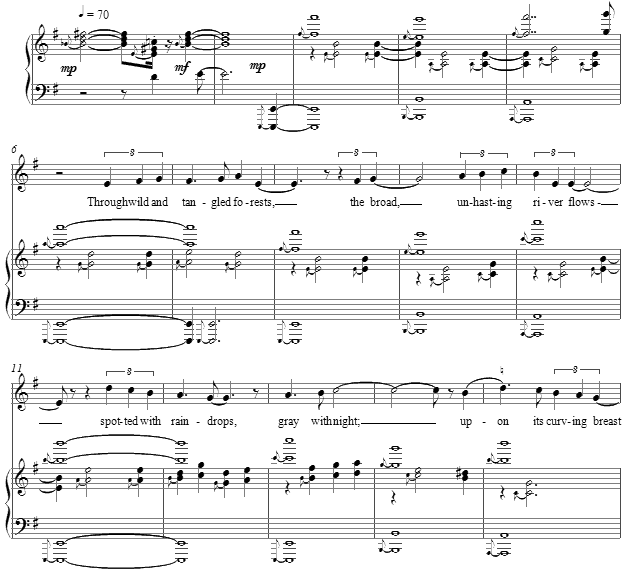Music and Texts of GARY BACHLUND
Vocal Music | Piano | Organ | Chamber Music | Orchestral | Articles and Commentary | Poems and Stories | Miscellany | FAQs
On the Mississippi - (2007)
Hamlin Garland
for medium voice and piano
Through wild and tangled forests
The broad, unhasting river flows--
Spotted with rain-drops, gray with night;
Upon its curving breast there goes
A lonely steamboat's larboard light,
A blood-red star against the shadowy oaks;
Noiseless as a ghost, through greenish gleam
Of fire-flies, before the boat's wild scream--
A heron flaps away
Like silence taking flight.[ 2 pages, circa 2' 20" ]
Hamlin Garland
Hamlin Garland (1860-1940) was an American novelist and short story writer as well as poet. He was active as a social reformer, especially concerned with Native American rights -- once unabashedly known as "Indian rights." This text is taken from Prairie Songs (1893).
Garland was born in West Salem, Wisconsin. After moving with his family to a succession of homesteads in Iowa and South Dakota, he went to Boston in 1884 determined to embark on a literary career. His first success was Main-Travelled Roads, a collection of short stories published in 1891. He moved to Chicago in 1893, lectured widely on literary topics, and agitated for a realistic American literature through a number of essays, some of which were revised into his 1894 manifesto, Crumbling Idols. In 1895 he published Rose of Dutcher's Coolly, a novel of a New Woman in which he sought to embody his literary creed. That year he began visiting the American West, making notes of cowboys and studying the American Indian, taking copious notes for later use in fiction. A number of his Indian stories were collected in The Book of the American Indian (1923).
He received a commission in 1896 from Samuel S. McClure to write a biography of Ulysses S. Grant which, after two years of exhaustive research, was serialized in McClure's Magazine before appearing in book form in 1898. That year he followed the Klondike gold rush in search of adventure and literary material; from that trek emerged The Trail of the Gold Seekers, a "record in prose and verse" of his experience. In 1899 he married Zulime Taft, the sister of the sculptor Laredo Taft. Over the next 15 years he published a series of romances of the mountain west, the most successful of which was The Captain of the Gray-Horse Troop (1902), a novel of cattlemen and Indian conflict. In 1915 he moved to New York City to be closer to his publishers and literary life. In the mid-teens Garland was wearying of publishing fiction and turned to reminiscing about his early life. The result was A Son of the Middle Border, an autobiography-cum-history of westward expansion, which appeared serially before being brought out in book form in 1917, to nearly universal acclaim. Its success prompted a sequel, A Daughter of the Middle Border, which was awarded the Pulitzer Prize for biography in 1922. Two more volumes of his family history followed: Trail-Makers of the Middle Border (1926) and Back-Trailers from the Middle Border (1928). Garland had discovered his niche as a memoirist and cranked out 4 more volumes of his literary reminiscences, based on his daily diary: Roadside Meetings (1930), Companions on the Trail (1931), My Friendly Contemporaries (1932), and Afternoon Neighbors (1934).
In 1929 Garland moved to Hollywood, California, where he spent his final years in a renewed interest in psychic phenomena, an enthusiasm of his early years in Boston. In Forty Years of Psychic Research (1936) he traced the history of his life-long interest. His last book, The Mystery of the Buried Crosses (1939), is a record of his efforts to verify the legitimacy of a medium who, at the direction of spirits, led him to mysteriously-buried objects. On March 4, 1940, at age 79, after a life filled with successes and tempered with disappointments, having received many honors and a distinguished place in American literature, Hamlin Garland died.
The augmented triad is often associated with the steam whistle, which could have been heard frequently on the river. Opened with a damper, the whistle changed pitch according to the pressure from the boiler let through the line. The long and lazy musical gestures are meant to suggest an unhurried moment in time.

